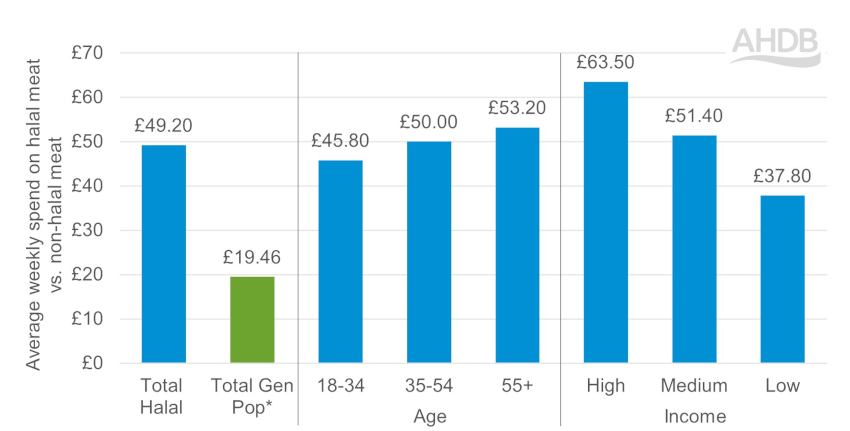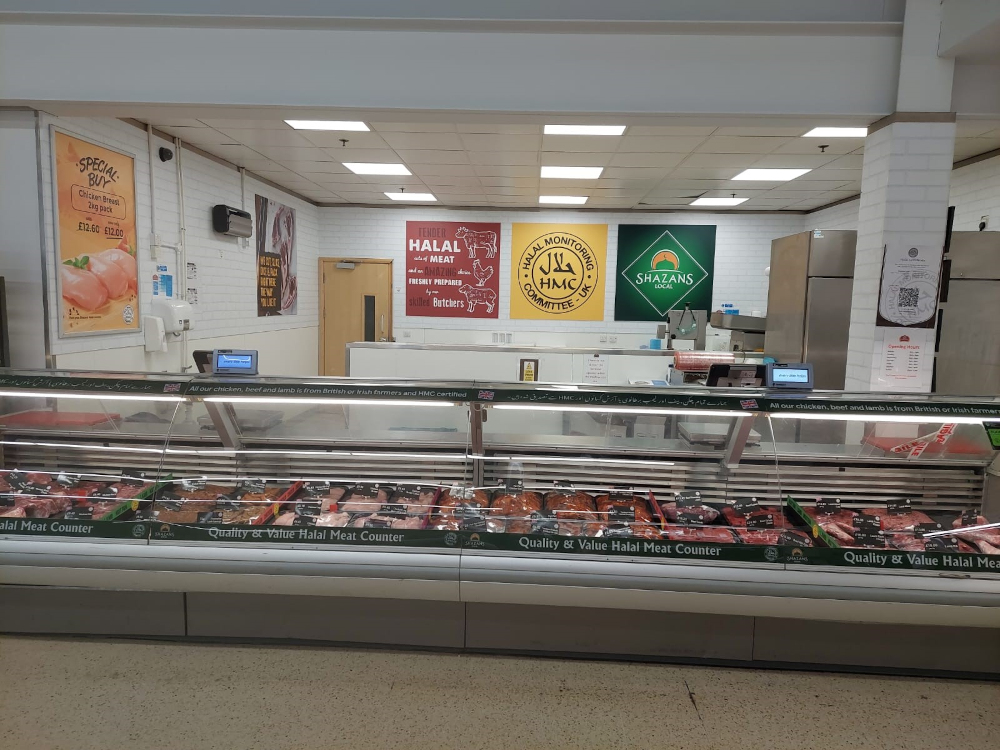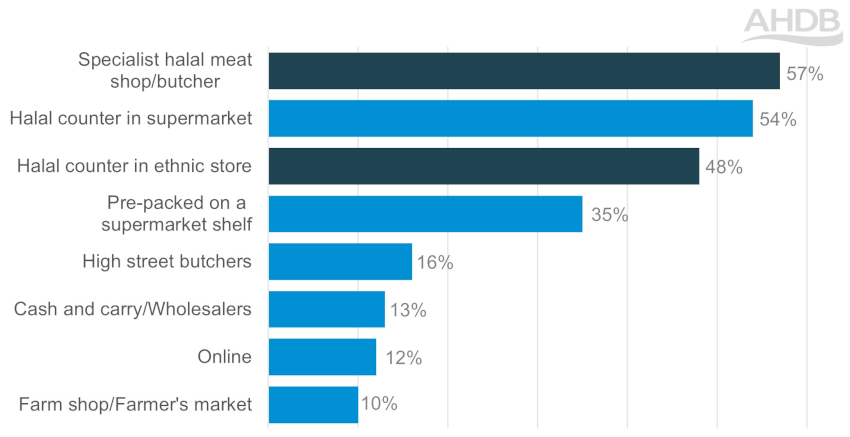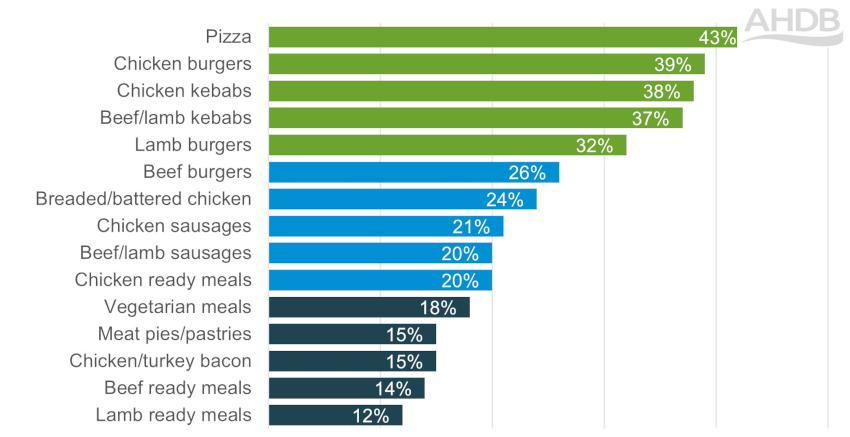- Home
- Knowledge library
- Halal purchasing and eating behaviours
Halal purchasing and eating behaviours
According to our research, Muslims are consuming more meat than the general UK population, so we assessed how this compared in terms of claimed weekly spend.
The average halal shopper claimed to spend £49.20 per week on meat, compared with the average claimed weekly spend in the UK of £19.46. This can be attributed to the larger average household size and the greater consumption of meat per capita.
Claimed average weekly spend is just under £50 on halal meat, over double the average meat spend of the general population

Notes: *Nationally representative sample including halal consumers
Where do people buy halal meat from?
Specialist meat shops or butchers have always been the preferred channel for halal consumers. These are local, independent stores usually run by Muslims, who have real knowledge of halal meat, have gained the trust of the local community, provide a personal service, offer a good variety of cuts and the ‘best price’.
These stores are favoured by the Established Muslim group (see definitions of Established and Emerging under ‘Two types of consumers’) because these shops support the local community, can be a social meeting place, offer cuts that suit traditional cooking and their meat is perceived as fresher.
Most halal meat is bought from specialist stores, but supermarket meat counters are a strong option for shoppers. Pre-packed meat in supermarkets and other channels are less popular options, used by only a minority of purchasers.
“My new butcher gives me a better deal, I always look for ways to stretch my meals. At the end of the day, I need to save my pennies.”
Female, Indian, 35-54, London
“Nowadays it’s much easier now to get halal meat in supermarkets. They’ve got that understanding; they’ve opened up a counter for halal meat. Before, you could only get it in our Asian shops.”
Male, Indian, 55+, London

Preferred location when purchasing halal meat

Supermarkets also offer a halal range both in store and online, with certain stores having a halal butchers counter and a pre-packed range on offer. Supermarkets offer convenience for a one-stop shop with good value and are thought of as hygienic.
However, their range is limited, and they are seen as transactional in nature. The supermarket appeals more to Emerging Muslims, as it fits in with their busy lifestyle and with a limited range at a set price.
Halal meat in supermarkets
Pre-packed halal meat is less appealing to consumers, with only 35% purchasing compared with 57% buying from a specialist butcher and 48% from a halal counter in world food stores.
Lack of halal certification is the main inhibitor to purchasing from supermarket shelves, alongside the perceived view of the freshness of the products. Clear halal certification is stated as important for 92% of halal consumers, because this provides the assurance they need that the product has been produced under strict guidelines.
Supermarkets often label their aisles as ‘Asian’ or ‘world foods’ and meat as halal. But to reassure consumers, the halal certification needs to be clear.
In the research, Muslim consumers did acknowledge that the pre-packed halal range in supermarkets offers good value for money. But they found the packaging dull and uninspiring versus other meat.
A limited range of branded halal meat products is available in some supermarkets, and shoppers recognised these as “good” halal products. Optimising red meat packaging and labelling on halal products, along with certification, could provide a real opportunity for retailers to generate interest and leverage sales.
Eating in home
Only half of halal shoppers classify themselves as confident cooks; most of these are established rather than Emerging Muslims. When eating at home, traditional dishes like lamb or mutton curries and casseroles are still popular among many households, as can be seen below and by their most popular cuts and high level of purchasing each week.
Most widely bought cuts of halal meat lamb versus mutton
| Cuts of meat | % of halal consumers buying lamb | % of halal consumers buying mutton |
|---|---|---|
| Chops | 52% | 40% |
| Mince | 52% | 38% |
| Leg | 44% | 31% |
| Shoulder | 42% | 34% |
- Average cuts of halal lamb bought per week = 3.7
- Average cuts of halal mutton bought per week = 2.9
Halal cooking social media inspiration
Within the Emerging group, 29% of Muslims said they enjoy cooking but have a limited repertoire and lack the experience of cooking more traditional dishes. They recognise this is a desired skill they would like to have and are turning to social media for recipe inspiration.
To highlight certain cuts and increase purchasing of lamb among younger halal consumers, halal butchers, counters and supermarkets could provide recipe suggestions at the point of sale.
.jpg)
Source: Zainab Pirzada (Cookingwithzainab)
While there is a desire to improve their cooking skills, many are happy at times to buy prepared food for eating in home − for ease, time saving and as a consequence of pester power. Pizzas, burgers and kebabs were the favoured options; ready meals took a lower priority due to limited selection and availability in store.
“I’m not a great cook, but TikTok is great for giving me inspiration, I follow loads of Asian influencers.”
Female, 25–34, Pakistani, Birmingham
“I cook a lot more lamb now, I can just go on TikTok and find a lamb recipe.”
Female, 35–45, Moroccan
“I like Nadiya Hussein. You can trust her: you know she cooks halal.”
Female, 25–45, Pakistani, London
Pre-prepared food products typically bought

Eating out
There is a real desire to eat good-quality, tasty halal food out of the home. With many Muslims running restaurants and delivery services offering exclusively halal food, there are plenty of catering options for them to choose from, including restaurants, hot food on the go and takeaways. The only area highlighted by respondents as a concern was the lack of office-lunch-type options, such as sandwiches and meal deals from supermarkets or local stores.


